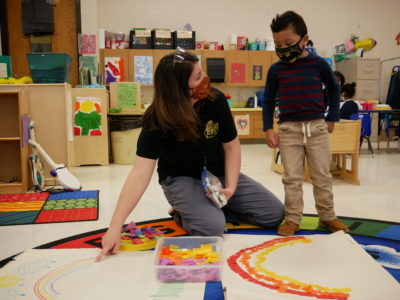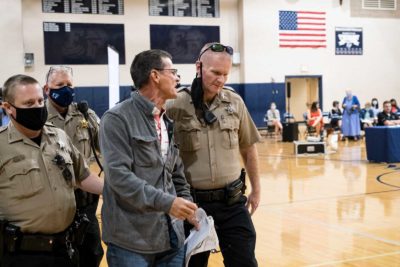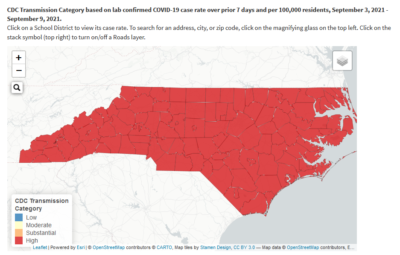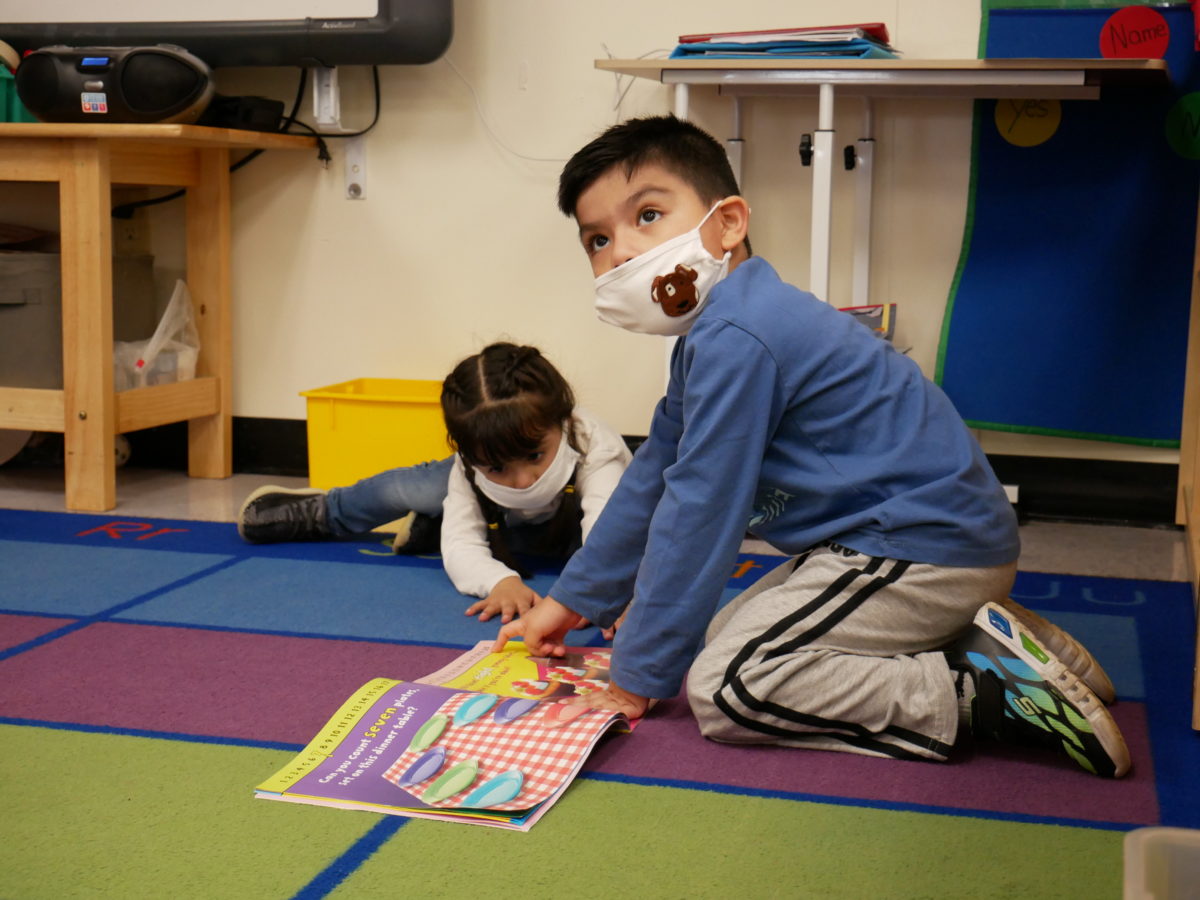

Updated 1:44 p.m. Sept. 28 with statement from State Superintendent and State Board of Education leaders about safety concerns at local school board meetings. Scroll to bottom for statement.
Leaders with the North Carolina School Boards Association (NCSBA) reached out to Gov. Roy Cooper and lawmakers in recent weeks, asking for help with the tension at local school board meetings over COVID-19 school mask policies.
This year, Cooper allowed policy decisions on student-masking to be made by district school boards, rather than ordering a statewide policy through executive order as he did last year. Meanwhile, the General Assembly passed, and Cooper signed, a law that requires those boards to vote on whether masks are required or optional once a month for this entire school year.
In an email to legislators sent last Tuesday, Bruce Mildwurf, director of governmental relations for the NCSBA, laid out the problems this has created.
“A disturbing trend is occurring across the State over COVID-19 mitigation measures. There are increasing numbers of disruptions and cases of verbal abuse by protestors. Boards chairs have been forced to recess or adjourn meetings. There were accusations of one attendee bringing a weapon to a school board meeting. Property has been damaged. School board members and staff have received threats. Security has been significantly increased at board meetings. Rallies and protests are organized by people who don’t even live in the district. Board members and staff fear it’s just a matter of time before it escalates to serious violence,” he wrote.
Mary Ann Wolf, executive director and president of the Public School Forum of NC and a member of the board of Chapel Hill-Carrboro City Schools, wrote a piece last week in which she talked about the climate education leaders are currently facing at the local level.
“In my school district, we no longer have in-person school board meetings without a police officer present,” she wrote. “And, we are not alone. I regularly talk with colleagues — school board members and superintendents — across the state who are fearful for or receive threats to their safety.”
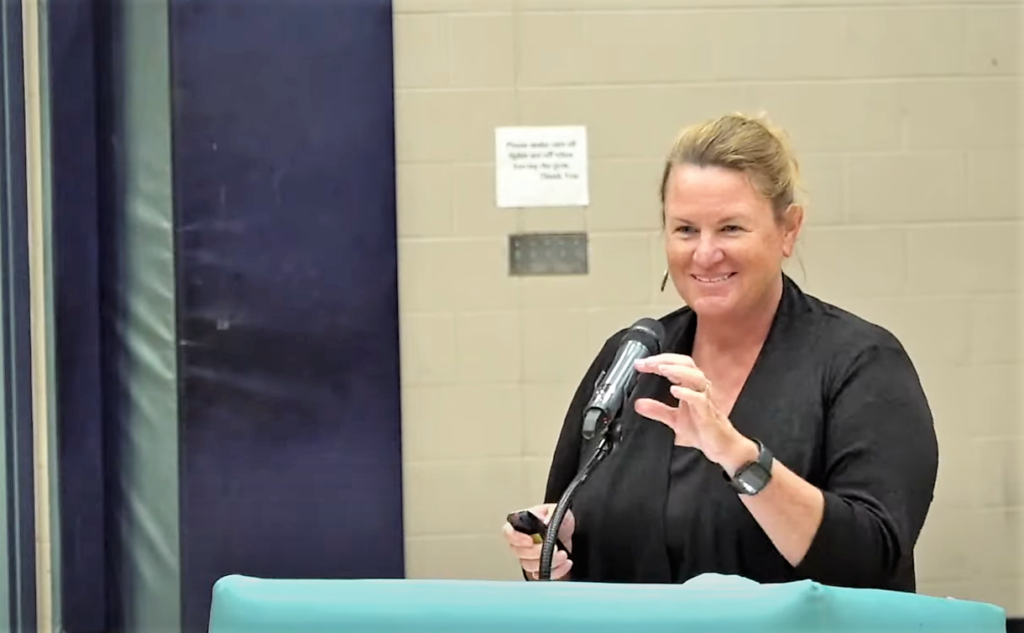

In his letter to legislators, Mildwurf went on to ask lawmakers to change a portion of the law they passed requiring monthly votes on masks: “A provision in SB 654 (SL 2021-130), K-12 COVID-19 Provisions, which passed both chambers on the third day of school should be modified to help alleviate the tension. The bill has many positive and important provisions for LEAs. However, Section 10, which requires all local boards of education to vote at least once a month on its mask policy will continue to exacerbate the issues above.”
The letter explains what modifications the NCSBA is seeking.
“We question the requirement to vote on the policy every month if nothing has significantly changed since the last vote,” Mildwurf wrote. “Therefore, we respectfully request that the General Assembly modify the current law to require either local school boards or the State to establish metrics that would trigger a re-examination of the policy.”
In a statement emailed to EdNC last week, Lauren Horsch, communications advisor to Senate President Pro Tempore Phil Berger, R-Rockingham, said, “That some people are protesting decisions of their elected leaders is not legitimate grounds to change a law.”
The statement also included: “Allowing constituents to have their voices heard by an elected body is a good thing for democracy, and the General Assembly is not going to restrict that.”
Here is the email to legislators from the NCSBA:
In a Sept. 17 letter, Amy Churchill, president of NCSBA, and Leanne Winner, the association’s executive director, told the governor they want to work with him “to design measures that will help alleviate some of the tension locally so that school boards and administrators can effectively do the necessary work to educate our students.”
Similar to the letter to legislators, Churchill and Winner explained the problem to the governor and also wrote about how overwhelming the strife has become for local school board members.
“While local board members recognize that the issues raised by the pandemic are important, they have become all-consuming, crowding out the ability of both school system staff and board members to focus on other matters. It is important that our school board members and administrators spend their time on educating students, not debating the same controversial issues over and over again with the public or each other,” they said.
Here is that letter:
At a press conference last week, Cooper called for maturity among adults at school board meetings.
“Threats, bullying, intimidation — none of this belongs in our public schools, particularly by adults,” Cooper said, according to The News & Observer. “Remember, our children are watching.”
State Superintendent of Public Instruction Catherine Truitt, State Board of Education Chair Eric Davis, and Vice Chair Alan Duncan released a joint statement today about safety concerns at district school board meetings. Here is it in its entirety:
“As education leaders in our state, we are united by our fierce passion for serving students and in our commitment to providing all students and those serving our students with a safe environment. As we continue to see instances of violence unfold during some local school board meetings, we are yet again unified. The increased hostility and threats of force that we have seen across the state are not reflective of what we expect and ask of our own students: treating others with kindness and respect.
“As educators, as parents and as concerned citizens, we respect the rights of our fellow citizens to share their concerns and voice their opinions. However, this must be done without the use of intimidation or intentionally inspiring fear. Every one of us has a responsibility to instill in our children their first amendment rights and responsibilities, but we have an even greater responsibility to model good behavior while doing so.
“Our schools and district buildings should remain safe havens, and these acts of aggression cannot be tolerated. Our school board members and local leaders should not be threatened. Especially in times of disagreement, we should act with civility and respect for our teachers, local boards, superintendents, and school staff who are doing their best throughout this unprecedented time to lead, guide and educate our students. We invite you to join us in this endeavor.”


